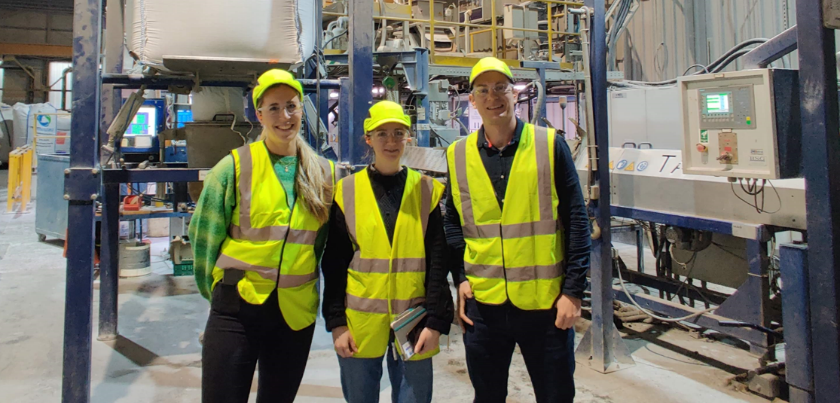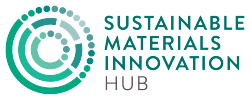This website uses cookies so that we can provide you with the best user experience possible. Cookie information is stored in your browser and performs functions such as recognising you when you return to our website and helping our team to understand which sections of the website you find most interesting and useful.

Tracking Recycled Content in Plastics and Packaging: ReCon²
Case Study
Royce’s Industrial Collaboration Project (ICP) awarded £43161.70 to ReCon2, a University of Manchester spin-out initiative developing a low cost, simple, and quantitative method of verifying recycled content in plastic items through the incorporation of low quantities of fluorescent tracer molecules. This technology will allow for the identification of post-consumer recycled materials incorporated into plastic products.
Presently, there is no reliable analytical approach to quantify plastic post-consumer recycled materials (PCR) incorporation into plastic products and packaging, with the industry being forced to rely on tenuous and opaque mass flow calculations across complex supply chains. This means the actual recycled content in certain plastics remains ambiguous, preventing businesses and consumers from making informed choices. ReCon2 has developed its fluorescent tracer molecule technology as a solution.
In September 2022, ReCon² initiated a series of 12-month long pilot-scale trials to demonstrate our technology in industrially relevant environments. Specifically, the project aimed to validate the technology across a range of packaging plastics (e.g. polyethylene, polypropylene, polyethylene terephthalate) and formats (e.g. bottles, films, closures). This is being done in conjunction with various industry sponsors, including brands, plastic manufacturers, and recyclers.
Three of these pilot-scale trials have been completed successfully as of Q1 2023, with a further four scheduled for completion in Q2-4 2023. The pilot involved travel to various production sites across the UK, incorporation of our additive into recycled plastic streams and conversion into packaging articles, followed by laboratory testing. Recycled content levels in the materials and articles produced from these first three trials was quantified accurately.
Due to the ambitious nature of the undertaking, Royce’s ICP award has proven critical in instigating this work in a short timeframe, by subsidising a considerable portion of the associated costs including salaries, lab access costs and consumables. Our masterbatch preparation, sample processing, and testing were all conducted using the state-of-the-art laboratories of the Sustainable Materials Innovation Hub (SMI Hub), an initiative supporting SMEs in Greater Manchester to make smart, sustainable material choices located within the Henry Royce Institute Hub at the University of Manchester. Successful completion of this project and our remaining pilot trials is a precursor to taking our quantification service live in Q4 2023.
The SMI Hub facilitated access to mechanical extruders for masterbatching and sample dilution of our fluorescent marker; fluorescence spectroscopy for recycled content quantification in plastic articles produced during our multi-tonne manufacturing trials; environmental degradation chambers to verify the long-term stability of our marker in different product configurations; and the thermomechanical testing suite to understand the impact of our fluorescent marker on material properties.

While individual pieces of equipment could have been accessed elsewhere, the benefit of working with the SMI Hub at the University of Manchester is the layering of expert knowledge over the equipment provision. The facility provides deep sustainability and polymer knowledge with an array of state-of-the-art characterisation equipment. It is a one-of-a-kind facility within Manchester, and perhaps even the UK.
ReCon² is a University of Manchester initiative committed to developing a cost-effective and accurate quantitative method of verifying recycled content in plastic items through the incorporation of low quantities of fluorescent tracer molecules. With the aid of ICP funding and using the SMI Hub’s facilities, two pilot-scale trials have now been completed. The trials successfully quantified the level of recycled content in samples by using mono-material polyethylene pellets and films containing our fluorescent tag to verify the level of recycled content present in a material.
It is fantastic to continue ReCon²’s close collaborations with the SMI Hub, Henry Royce Institute, and the University of Manchester – supported by the Royce ICP programme – to further develop our breakthrough plastic recycled content quantification technology and ensure it is fit-for-purpose. Our ongoing pilot-trial validations are an important step towards levelling-up the way recycled content is reported, addressing the issues of green-washing currently pervading the plastics industry, and delivering global impact by achieving a circular economy for plastics use in the UK and beyond.
Dr Thomas Bennett (MRSC, MIMMM)
ReCon² Limited Director and Research Fellow at University of Manchester
Collaborators
Through ReCon²’s visiting analytical scientist, Dr Gemma Davison, we worked closely with Prof Michael Shaver, who is Professor of Polymer Science in the School of Natural Sciences at The University of Manchester and Director of the SMI Hub. His interdisciplinary team has world leading expertise in evaluating and optimising mechanical recycling, developing selective routes for polymer depolymerisation, and designing sustainable plastic systems.
Throughout the project we benefitted immensely from Prof. Shaver and his teams’ deep in-house technical knowledge, experience embedding sustainable plastic systems within businesses, and understanding of the complexities of translating innovative ideas into commercial enterprises. This was further boosted by our access to the SMI Hub’s state-of-the-art laboratories and equipment and the technical team supporting the facility.
Further Information
Total funding awarded to Royce Partner (University of Manchester) was £29,945.20
Total funding awarded to industry partner (ReCon² Limited) was £13,216.50.



